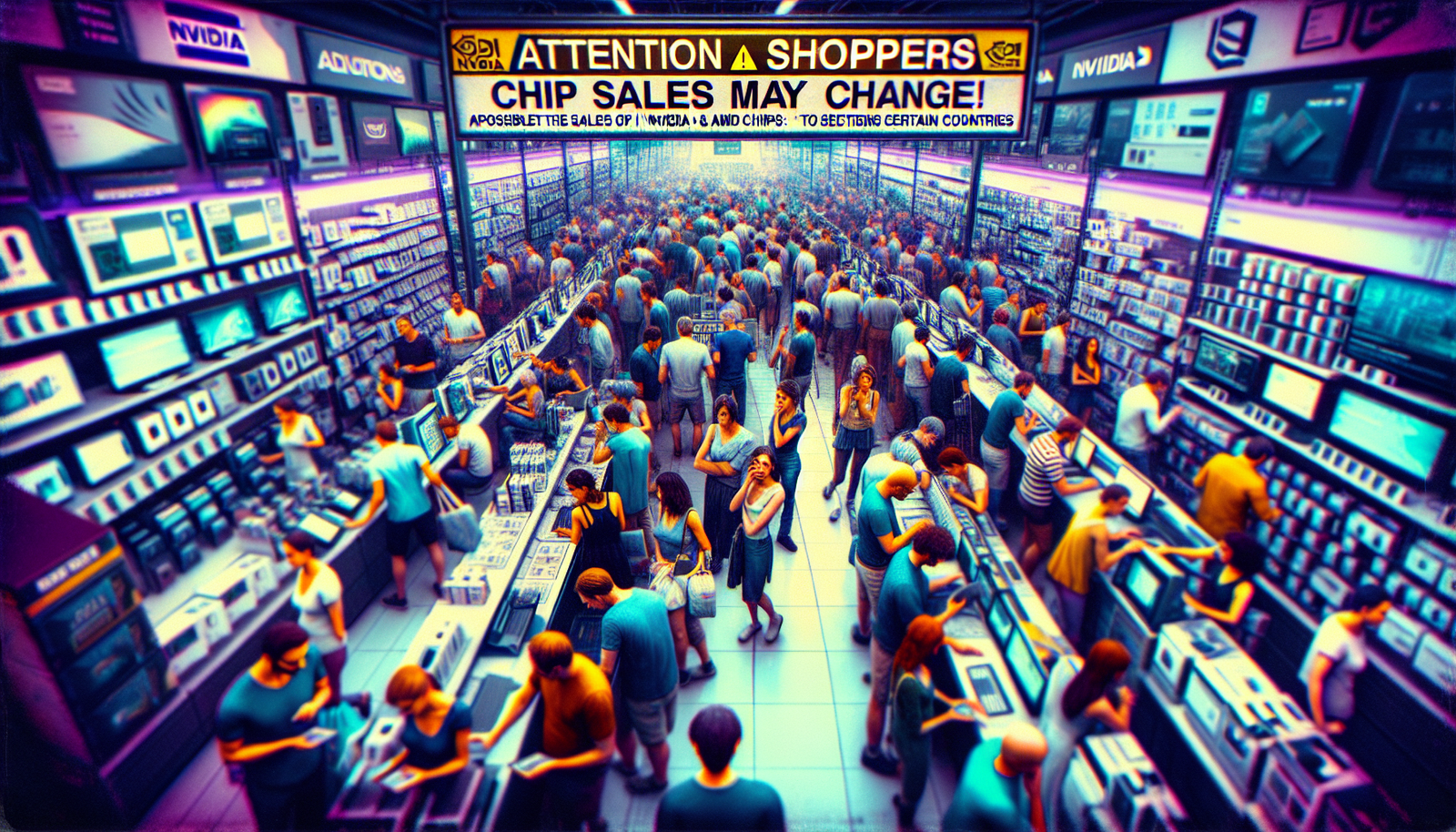The new U.S. restrictions on chip Nvidia and AMD exports to certain countries raise major geopolitical issues. These measures aim to preserve the technological advantage of the United States in the face of the rise of artificial intelligence capabilities in China and Russia. The decision to limit sales intensifies the race for advanced technologies and creates profound repercussions in the semiconductor market. Political choices now influence the strategies of technology giants and redefine their access to crucial markets.
Restrictions on chip exports
The United States is considering imposing restrictions on the sale of chips made by companies such as Nvidia and AMD to specific countries, particularly China and Russia. These measures aim to curb the technological advancements of these nations, especially in the field of artificial intelligence.
Context of sanctions
Since 2015, Washington has gradually tightened restrictions on the export of sensitive technologies. The first waves of sanctions were intensified in 2021, as part of a broader strategy to maintain American technological leadership in the face of the rise of technological capabilities in China and Russia.
New measures to come
Recent information indicates that the new restrictions could include a ceiling on sales of certain artificial intelligence chips, particularly those from AMD and Nvidia, to markets deemed sensitive. These changes could harm the business interests of high-tech companies, especially in the context of a growing demand for advanced computing capabilities.
Pressure on Nvidia and AMD
Nvidia, already impacted by previous sanctions, now has to apply for export licenses to ship products to countries such as China. The H100 and A100 models, considered performance accelerators, are already under increased scrutiny.
Impact on the market
The proposed restrictions are likely to cause a fluctuation in the stocks of semiconductor companies like Nvidia and AMD. Indeed, the prohibition on selling advanced chips could hinder their access to the Chinese market, which is vital for their growth.
Industry reactions
American technology companies express their concerns about the ramifications of such restrictions. A spokesperson for AMD has already warned that these measures could harm the overall competitiveness of American companies in the global market.
Long-term perspectives
Growing geopolitical tensions will likely exacerbate the struggle for technological supremacy. According to some analysts, the implementation of these measures could encourage Chinese companies to intensify their own research and development efforts, particularly with collaborations such as that between Huawei and Baidu.
Growing competition in Asia
China continues to develop its own artificial intelligence chips, with companies like Huawei launching models capable of competing with those of Nvidia. Huawei’s recent announcement regarding the sending of samples of its new chip is emblematic of this dynamic
Impact on semiconductor companies
In this context, other industry giants, including Intel and TSMC, are also trying to strengthen their capabilities and establish new factories on European soil, an initiative likely to affect the global distribution of chips.
Evolution of Nvidia’s stocks
In this climate of uncertainty, Nvidia’s stocks have recently experienced increased volatility. CEO Jensen Huang has mentioned a “ridiculous” demand for products related to artificial intelligence, captivating the attention of investors despite an increasingly restrictive regulatory environment.
Structured conclusion
The repercussions of these potentially forthcoming restrictions highlight a new phase of trade tensions between the United States and China. Market actors must adapt their strategies in the face of this evolution that could redefine the contours of the semiconductor sector.
This climate of uncertainty will remain a major concern for investors and analysts in the field, as control measures continue and potential twists are expected.
Frequently asked questions
What are the motivations behind the limitation of chip sales from Nvidia and AMD by the United States?
The United States seeks to restrict access to advanced technologies for certain countries, particularly China, that could be used for military purposes or to develop artificial intelligence capabilities that threaten their national security.
Which chips are affected by these new restrictions?
The new restrictions mainly concern advanced AI chips such as Nvidia’s A100 and H100 models, as well as other similar products offered by AMD.
When will these restrictions come into effect?
The new restriction measures begin to be implemented as soon as they are announced, but specific details regarding exact dates may vary depending on subsequent administrative decisions.
How will these restrictions affect the chip market in China?
The restrictions may lead to a decrease in the supply of advanced chips for Chinese companies, which could slow their ability to innovate in technology sectors, particularly AI.
Can American companies like Nvidia and AMD still sell chips in China?
Yes, but they must obtain an export license for certain products, which significantly complicates the shipping process to China and other countries subject to restrictions.
What alternatives do Chinese companies have in light of this limitation?
Chinese companies may turn to local chip suppliers or develop their own technologies, as evidenced by the rise of companies such as Huawei and Baidu in the semiconductor field.
What impacts could these restrictions have on the stocks of Nvidia and AMD?
The restrictions could harm the revenue prospects of Nvidia and AMD, leading to volatility in the stock market, as well as a potential decline in their stock values.
Have these measures been implemented before?
Yes, similar restrictions were introduced in 2015 and tightened in 2021, targeting the sale of advanced technologies to China for national security reasons.
Are other countries also affected by these export restrictions?
The restrictions primarily target China and Russia, but they may also extend to other countries considered to pose risks to U.S. national security.
How are foreign governments reacting to these restrictions?
Reactions vary, with some countries seeking to strengthen their own technology and semiconductor capabilities, while others express concerns about the impacts on innovation and technological cooperation.






